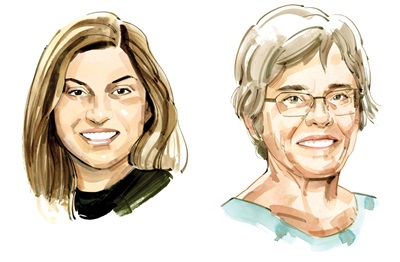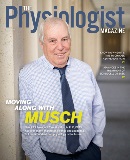Balance Beam
How to prioritize a personal life and avoid research burnout.
 Each issue, we ask a trainee
member to pose their career questions to an established investigator and mentor. Here, Zdravka (Ava) Daneva, PhD, a postdoctoral fellow at the University of Virginia, asks Susan M. Barman, PhD, FAPS, University Distinguished Professor at Michigan
State University, how to prepare for overwhelm and burnout.
Each issue, we ask a trainee
member to pose their career questions to an established investigator and mentor. Here, Zdravka (Ava) Daneva, PhD, a postdoctoral fellow at the University of Virginia, asks Susan M. Barman, PhD, FAPS, University Distinguished Professor at Michigan
State University, how to prepare for overwhelm and burnout.
Q: From a postdoctoral position, what is the best way to approach academic departments for employment as an assistant professor?
A: A best practice is to become known to leaders in your field of interest as early
as possible, even while a graduate student. You are the best advertiser of yourself. Present your research at professional society meetings, serve on national committees that give you exposure to senior professionals, meet with seminar speakers at
your home or other local institutions, or seek opportunities to invite leaders in your field to give a seminar in your department. Being visible to more senior people can really pay off. I can say this is how I landed my dream postdoc! I was actually
approached by Dr. Jerry Gebber after giving a talk at a FASEB meeting in Atlantic City in spring 1975. He had heard several of my talks and asked me if I would come to interview for a postdoc. The rest is history, as we were a well-known and accomplished
research team until his death in 2009.
As time is approaching for you to apply for a job, let those in your research network know that you are looking for a faculty position and would appreciate their help in directing you to potential openings. Remind them of why you would be a great candidate.
“Let those in your research network know that you are looking for a faculty position and would appreciate their help in directing you to potential openings.”
Q: How do you maintain a balance between personal life and research?
A: Some of my colleagues might say I am the worst person to answer this question. A graduate student once said, “Why did you buy a
condo? You live in the Life Science Building!” Until the COVID-induced stay-at-home order, I admit I spent many hours there (often first to arrive and last to leave seven days a week). That, however, does not mean I do not balance my personal
life and professional life. After having 29 roommates during my college and grad school years, I was so excited to be able to afford to live alone when I started my postdoc—and I still like living alone.
My personal time is often spent doing things removed from science, such as reading books, taking long walks and doing water aerobics. I also definitely enjoy spending plenty of time with family and friends. They are my strength and keep me in good spirits. I love my career, and it has obviously been very important to me, but my career only has value because I can share my life with friends and family.
Q: How do you deal with burnout or overwhelm during busy research/publishing/grant application times?
A: I don’t think I have ever experienced true burnout, as I usually have multiple things going on, so if
I hit a wall on one project, I switch my focus to another one. I certainly have felt overwhelmed when deadlines for multiple projects are fast approaching. I keep a to-do list and love crossing things off that list. I have even been known to put some
very mundane things on it just so I can be sure to cross something off.
I also have a very unusual habit of not adhering to real deadlines. I actually make the deadline much earlier. A good example is that I always submitted my grants at least a month ahead of the deadline. I did it for my first National Institutes of Health grant submission in 1985 and the grant was funded, so it became my good luck charm.
It’s easy to get overwhelmed when you are being asked from many sources to “volunteer” to do extra work. A friend recently said it’s not simply learning to say “no” to some of these requests; it’s learning to prioritize which of the requests are best completed by you rather than passing on to someone else and which are most in line with your career goals.
Got a career question you'd like to submit? Email it to tphysmag@physiology.org. We may use it in an upcoming Mentoring Q&A.
The Physiologist Magazine
Read the Latest Issue
Don’t miss out on the latest topics in science and research.
View the Issue Archive
Catch up on all the issues of The Physiologist Magazine.
Contact Us
For questions, comments or to share your story ideas, email us or call 301.634.7314.


